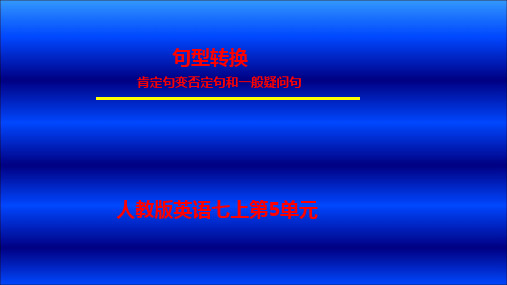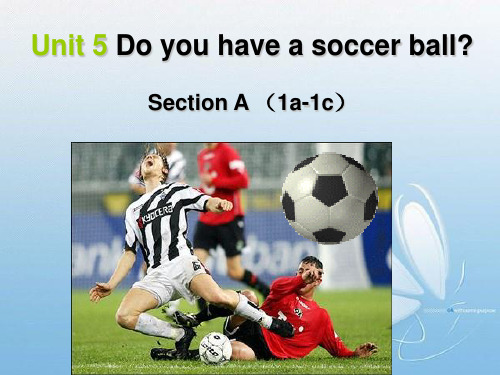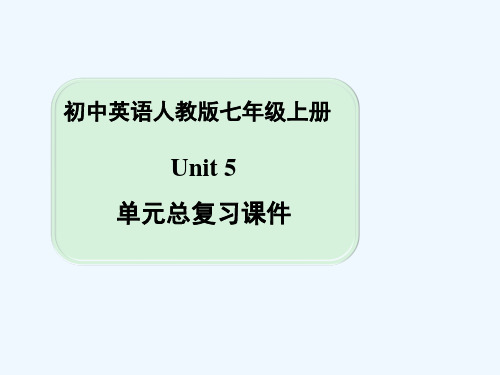人教版七年级英语上册Unit5全单元课件
合集下载
2020七年级上册英语unit5单元全套优质课件(人教版)

volleyball basketball
hey let us let’s=let us go we late has get
n.排球 n.篮球 interj.嘿;喂 v.允许;让 pron.(we 的宾格)我们 让我们(一起) v.去;走 pron.我们 adj.迟到 v.(have 的第三人称单数形式)有 v.去取(或带来);得到
短语连线。 1. 网球 2. 乒乓球拍 3. 足球 4. 棒球拍 5. 听起来不错
A. soccer ball B. sound good C. tennis ball D. ping-pong bat Ech the words with the things in the picture.
balls.
3
2
4
Tapescripts
Conversation 1: Bob: Do you have a soccer ball, Paul? Paul: No, I don’t. Bob: Does your brother Alan have one? Paul: Yes, he does.
Conversation 2
John: Hi, Mike. Mike: Hi, John. John: I want to play basketball. Do you have
a basketball? Mike: Yes, I do. John: Great!
Conversation 3
Jane: Hi, Sally. Sally: Hi, Jane. Jane: Sally, this is my friend, Anna. Sally: Hi, Anna. Nice to meet you. Anna: Nice to meet you, Sally. Sally: Let’s play tennis. Do you have a tennis ball,
初中英语 人教版七年级上册Unit5 肯定句改为否定句和一般疑问句课件

保镖法
eg: He likes bananas.(改为否定句)
He d_o_e_s_n_’__t_ __li_k_e_____ bananas?
第三人称单数胆子小, 出门需要带保镖
保镖开路,原形毕露
谓语动词是实义动词-------肯定句变一般疑问句
方法
主语第三人称单数 主语非第三人称单数
在句首加Does 在句首加Do
保镖开路,原形毕露
练一练
1 .My mother comes from Jiangsu.(改为否定句) My mother __d__o_e_s__n_’_ t co__m__e__ from Jiangsu.
2 They like swimming.(改为否定句) They ___d_o__n_’__t_ __li_k_e_____ swimming.
句型转换
肯定句变否定句和一般疑问句
人教版英语七上第5单元
目
根据谓语动词把句子分类 谓语动词是be动词怎么变否定句和一般疑问句 谓语动词是实义动词的怎么变否定句和一般疑问句的心脏
1. She is a student. 2. They are from China.
谓语动词是be动词
√ I'm not a boy. × I amn’t a boy.
e.g He is from China.(改为否定句) He is not from China.
He isn't from China.
谓语动词是be 动词-------肯定句变一般疑问句
方法
一提 二改
把be提前 第一人称改第二人称
保镖开路, 原形毕露
保镖开路,原形毕露
变否定句和一般疑问句方法
七年级英语上册第五单元课件

I have a basketball. 肯定句 ?
Do you have a basketball?一般疑问句
仔细观察,小组讨
Yes,
I
do.
论,这个句子是怎 样由肯定句变成一
No, I don’t.般(d疑o问n句o呢t ?= don’t)
肯定句变成一般疑问句时,要借助于助动词___d_o____, 放在句首;第__一___人称变第__二___人称;__句___号 变__问__ 号;语调用__升___调____。
用于构成否定句和一般疑问句
basketball
/ɑ :/ / I /
tennis ball
/e/ / I /
baseba仔l细l 观察,小组p讨ing-pong ball
/ei/ 论,你能说出这/ 些I / /ɒ/
baseb红a组l色l合字b/的æa母发t/或音者吗字v?母/oɒl/leyball
• 2.句型:I/We/They have a/an….
• He/she has a/an…..
• --Do you have…?—Yes,I do. /No, I don’t.
• --Does she/he have…?---Yes,she/he does.
• /No,she/ he doesn’t. • 3.掌握have和has的区别. • 4.理解听力内容.
Do you have a soccer ball?
√
Yes, I do. I have a soccer ball.
ping-pong bat
Do you have a ping-pong bat?
×
No, I don’t.
I don’t have a ping-pong bat.
人教版七年级上册英语 Unit 5Section A (grammar focus - 3c) 课件

2. Peter’s parents have a white cat. (改为否定句) Peter’s parents ___d_o_n_’_t_ ___h_a_v_e__ a white cat.
3. He has a nice hat. (用they代替he) __T__h_e_y__ ___h_a_v_e__ nice __h_a_t_s___.
questions with a partner.
A: Does Bob have a soccer ball? B: Yes, he does./ No, he doesn’t.
volleyball basketball
baseball bat baseball
eraser
tape player
10. 他们有一个篮球吗? _D_o_ they _h_a_v_e_ a basketball?
11. 是的,有。 Yes, __t_h_e_y __d_o__. 12. 没有。他们有一个排球。
_N__o_, they _d_o_n_’t_. They _h_a_v_e_ a _v_o_ll_e_y_b_a_ll_.
Write each word in the correct 3a
place in the chart.
do
does
I he they you we she it Eric
I they you we
he she it Eric
3b Fill in the blanks with do or does. Then
The music sounds beautiful. 这个主意听起来很棒。
The idea sounds great. 【拓展】
3. He has a nice hat. (用they代替he) __T__h_e_y__ ___h_a_v_e__ nice __h_a_t_s___.
questions with a partner.
A: Does Bob have a soccer ball? B: Yes, he does./ No, he doesn’t.
volleyball basketball
baseball bat baseball
eraser
tape player
10. 他们有一个篮球吗? _D_o_ they _h_a_v_e_ a basketball?
11. 是的,有。 Yes, __t_h_e_y __d_o__. 12. 没有。他们有一个排球。
_N__o_, they _d_o_n_’t_. They _h_a_v_e_ a _v_o_ll_e_y_b_a_ll_.
Write each word in the correct 3a
place in the chart.
do
does
I he they you we she it Eric
I they you we
he she it Eric
3b Fill in the blanks with do or does. Then
The music sounds beautiful. 这个主意听起来很棒。
The idea sounds great. 【拓展】
新人教版七年级英语上册-第五单元-SectionA课件

Do you have a soccer ball?
Yes, I do.
Tennis ball
Do you have a tennis ball? Yes, I do.
√
I have a tennis.
basketball
Do you have a basketball?
√
Yes, I do. I have a basketball.
Unit 5 Do you have a soccer ball?
Section A (1a-1c)
你知道多少“球”?
basketball
baseball
volleyball
soccer ball
tennis ball
football
ping-pong ping-pong bat
足球 football /soccer 篮球
1. do (第三人称单数形式does) 用于构成否定句和一般疑问句;做;干 2. have 有(第三人称单数形式has)
ping-pong 乒乓球
volleyball 排球 basketball 篮球
bat (乒乓球等的)球拍
My Room
I have a soccer ball .
Soccer ball
Group work:ask and answer like this:
A: Do you have a/an _____? B: No, I don’t. I have a/an…. A: Do you have a/an ______? C: Yes, I do.
Does she have a …? Yes, she does. No, she doesn’t .
Yes, I do.
Tennis ball
Do you have a tennis ball? Yes, I do.
√
I have a tennis.
basketball
Do you have a basketball?
√
Yes, I do. I have a basketball.
Unit 5 Do you have a soccer ball?
Section A (1a-1c)
你知道多少“球”?
basketball
baseball
volleyball
soccer ball
tennis ball
football
ping-pong ping-pong bat
足球 football /soccer 篮球
1. do (第三人称单数形式does) 用于构成否定句和一般疑问句;做;干 2. have 有(第三人称单数形式has)
ping-pong 乒乓球
volleyball 排球 basketball 篮球
bat (乒乓球等的)球拍
My Room
I have a soccer ball .
Soccer ball
Group work:ask and answer like this:
A: Do you have a/an _____? B: No, I don’t. I have a/an…. A: Do you have a/an ______? C: Yes, I do.
Does she have a …? Yes, she does. No, she doesn’t .
人教版七上英语Unit5单元总复习课件-PPT

根据提示填空。 1. Let’s w_a_tc_h___ TV together. 2. Staying at home(待在家)is very _r_e_la_x_i_n_g_(令人放松的). 3. This book is too b_o_r_in_g____ I can’t read it. 4. Does Tom __h_a_v_e_(有) ten baseball bats? 5. He is often __l_a_te__(迟到) for school. He is too lazy (懒惰
[常见用法] play作不及物动词时,意为“玩耍” ,可以用play with来表达。 play作及物动词时,后面可以接表示球类的词,意为“玩/打(球)”。play后 面也可以接表示乐器类的词,意为“演奏,表演”,但前面要先加定冠词 the。
Do you play tennis?你打网球吗?
She plays the piano every day.她每天都弹钢琴。
2.I am very ___________(interest) in the __________________(interest) book.
3.The homework is so____________, and he feels so______________(boring/bored)
I have, you have, they have.
She has, he has, Tony has.
三单:has, does
Do I ,do you ,do they?
非三单:have, do
Does she ,does he ,does Tony?
I don’t ,you don’t ,they don’t.
[常见用法] play作不及物动词时,意为“玩耍” ,可以用play with来表达。 play作及物动词时,后面可以接表示球类的词,意为“玩/打(球)”。play后 面也可以接表示乐器类的词,意为“演奏,表演”,但前面要先加定冠词 the。
Do you play tennis?你打网球吗?
She plays the piano every day.她每天都弹钢琴。
2.I am very ___________(interest) in the __________________(interest) book.
3.The homework is so____________, and he feels so______________(boring/bored)
I have, you have, they have.
She has, he has, Tony has.
三单:has, does
Do I ,do you ,do they?
非三单:have, do
Does she ,does he ,does Tony?
I don’t ,you don’t ,they don’t.
七年级英语人教版上册课件:Unit 5 单元阅读 (共10张PPT)
谢谢观赏
You made my day!
我们,还在路上……
( B )3.People use a stick to hit the white balls.This is
.
A.football
B.golf
C.tennis
D.basketball
( B )4.There are A.20
players in a football game. B.22
C.2
A.Yes,please. B.Good morning,Tom! C.Well,do you like sports?
D.I play tennis every day. E.But I have ping-pong bats. F.How are you? G.Do you play tennis after school?
A: 4
B:No,I don’t.I only watch them on TV.What about you?
A: 5
1. B 2. A 3. E 4. G 5. D
•不习惯读书进修的人,常会自满于现状,觉得再没有什么事情需要学习,于是他们不进则退。经验丰富的人读书用两只眼睛,一只眼睛看到纸面上的话,另 一眼睛看到纸的背面。2022年4月8日星期五2022/4/82022/4/82022/4/8 •书籍是屹立在时间的汪洋大海中的灯塔。2022年4月2022/4/82022/4/82022/4/84/8/2022 •正确的略读可使人用很少的时间接触大量的文献,并挑选出有意义的部分。2022/4/82022/4/8April 8, 2022 •书籍是屹立在时间的汪洋大海中的灯塔。
一、完形填空。 Hello!I’m 1 .I’m an English boy.I 2 two sisters. 3 are
You made my day!
我们,还在路上……
( B )3.People use a stick to hit the white balls.This is
.
A.football
B.golf
C.tennis
D.basketball
( B )4.There are A.20
players in a football game. B.22
C.2
A.Yes,please. B.Good morning,Tom! C.Well,do you like sports?
D.I play tennis every day. E.But I have ping-pong bats. F.How are you? G.Do you play tennis after school?
A: 4
B:No,I don’t.I only watch them on TV.What about you?
A: 5
1. B 2. A 3. E 4. G 5. D
•不习惯读书进修的人,常会自满于现状,觉得再没有什么事情需要学习,于是他们不进则退。经验丰富的人读书用两只眼睛,一只眼睛看到纸面上的话,另 一眼睛看到纸的背面。2022年4月8日星期五2022/4/82022/4/82022/4/8 •书籍是屹立在时间的汪洋大海中的灯塔。2022年4月2022/4/82022/4/82022/4/84/8/2022 •正确的略读可使人用很少的时间接触大量的文献,并挑选出有意义的部分。2022/4/82022/4/8April 8, 2022 •书籍是屹立在时间的汪洋大海中的灯塔。
一、完形填空。 Hello!I’m 1 .I’m an English boy.I 2 two sisters. 3 are
Unit 5 Section A 1a-1c 课件人教版七年级英语上册
A: __D__oyou____h_aav_e______te_n_n?is ball
B: No,___I_d_o_n_.’tI don't have a ____________ .
tennis ball
A: __D_o_they_____have
_vo_l_l_ey_b__a_ll?. B: No,___th__ey__d_o_n. ’Tt hey don't have a __v_o__ll_e__y_b_a__l_l_.
Work in pairs.
A: Do you have a/an/any…? -Yes, I do. I have a/an/some…. ( No, I don’t. I don’t have a/an/any….)
In order to make the dialogue real, we can add
听力策略: 抓物品关键词
ping-pong bat soccer ball volleyball ping-po
1c
---Do you/we/they have a /an…?
---Yes, I/We/they do./ No, I/We/they don’t.
Look and say
A: Do you have a ______b_a_s_k?etball B: Yes, I do. I have a _________ .basketball
2. Key sentences :
①Do you have a basketball ? Yes , I do. / No, I don’t.
② Do you have a ping-pong ball? Yes, I do./No, I don’t.
人教版英语七年级上册unit5课件第五单元句型和语法
They don’t like apples. Lily doesn’t play basketball
• 代词的主格和宾格 动词或介词后用宾格 • I ----me you---you she ---her • he ----him it ---it we---us they—them • He sees us at school • I like playing with him • Let us go • Excuse me
• Unit5 • 1 Do you have a soccer ball? Yes , I do. • 你有一个足球吗?是的, 我有 • 2 Do they have a basketball? No, they don’t. • 他们有一个篮球吗? 不, 他们没有。 • 3 Does she have a tennis ball? No, she doesn’t. • 她有一个网球吗? 不, 她没有。 • 4 Does he have a soccer ball ? Yes , he does. • 他有一个足球吗? 是的, 他有 • 5 Do you have a pingpong ball ?No, I don’t . • 你有一个乒乓球吗? 不, 我没有。 • 6Let’s go. We are late. • 让我们去吧。 我们迟到了 • 7 where is our baseball bat? • 我们的棒球拍在哪里? • 8 I have a volleyball and Bill has a baseball. • 我有一个排球 和 比尔有一个棒球
的同班同学打乒乓球
• 17 It’s easy for me .它对我来说是简单的 • 18 I love sports.我爱运动 • 19 My brother and I are in the same school.我弟弟
• 代词的主格和宾格 动词或介词后用宾格 • I ----me you---you she ---her • he ----him it ---it we---us they—them • He sees us at school • I like playing with him • Let us go • Excuse me
• Unit5 • 1 Do you have a soccer ball? Yes , I do. • 你有一个足球吗?是的, 我有 • 2 Do they have a basketball? No, they don’t. • 他们有一个篮球吗? 不, 他们没有。 • 3 Does she have a tennis ball? No, she doesn’t. • 她有一个网球吗? 不, 她没有。 • 4 Does he have a soccer ball ? Yes , he does. • 他有一个足球吗? 是的, 他有 • 5 Do you have a pingpong ball ?No, I don’t . • 你有一个乒乓球吗? 不, 我没有。 • 6Let’s go. We are late. • 让我们去吧。 我们迟到了 • 7 where is our baseball bat? • 我们的棒球拍在哪里? • 8 I have a volleyball and Bill has a baseball. • 我有一个排球 和 比尔有一个棒球
的同班同学打乒乓球
• 17 It’s easy for me .它对我来说是简单的 • 18 I love sports.我爱运动 • 19 My brother and I are in the same school.我弟弟
人教版七年级英语上册Unit5全单元课件
1. Do you have a ping-pong bat? have v. 有 一般指某人拥有某物,侧重于所属关系。 其第三人称单数形式是_h_a_s__。 Sb have/has sth. 某人有某物
【语境应用】ቤተ መጻሕፍቲ ባይዱ译下列句子。 1)我有一个好朋友。
I have a good friend. 2)她有一支新钢笔。
on the chair in Helen’s bag Bill has it.
Complete the conversation.
Cindy: Hey, Helen, _l_e_t’_s_g_o_! We’re late. Helen: OK. Cindy: Do you _h_a_v_e_ the baseball? Helen: Yes, _I_d_o_. It’s in my bag. Cindy: And where’s our baseball bat? Helen: Bill _h__a_s__ it. Cindy: Oh, yeah. And do you have your
Cindy: lHateey, HHeelyen,Hleetl’esngog! oWeW’ree’rlaete.let’s Helen: OK. Cindy: bDaoseyboaullhahvaevteheDboaseyboaull?the Helen: YYeess, IIdoi.nItm’syinbamgy bdaog.It’s Cindy: wAhnedrew’hs ebraes’esboaulrl bbaatsebAanlldbaot?ur Helen: iBt ilBl ihllas iht.as Cindy: Oh, yeah. AdondhadvoeyoAundhayvoeuyrojuarckjaetckyeot?u Helen: OOhh,, nnoo,, Iddoonn’t’t.IIt’osnonthtehcehcahiarir.It’s
- 1、下载文档前请自行甄别文档内容的完整性,平台不提供额外的编辑、内容补充、找答案等附加服务。
- 2、"仅部分预览"的文档,不可在线预览部分如存在完整性等问题,可反馈申请退款(可完整预览的文档不适用该条件!)。
- 3、如文档侵犯您的权益,请联系客服反馈,我们会尽快为您处理(人工客服工作时间:9:00-18:30)。
Dale Paul Mike
Does … have a ______?
Yes, … No, …
Listen to the conversation and 2d match the things with their right
places.
baseball baseball bat Helen's jacket
Listen and circle the words 1b your hear.
ping-pong bat volleyball
soccer ball ping-pong ball
have意为“有,拥有”。 听力原文
你有乒乓球拍吗?
是的,我有。
你有乒乓球吗? 不,我没有。
1c
Practice the conversation with your partner. Then ask
Let’s _g_o___ and find him.
听力原文
*have意为“有,拥有”。 我们可以用have(第三人称单数: has)表示物品所属关系。 *have (has)的一般疑问句可以 用来询问物品所属关系: Do you/they have… Does he/she have… 肯定回答:Yes, I/they do.
bat
baseball bat ping-pong ball
Match the words with the things 1a in the picture.
1. tennis ball _a_ 2. ping-pong bat
_f_ 3. soccer ball _c_ 4. volleyball _e_ 5. basketball _d_ 6. baseball bat _b_
— What’s that?
— It’s a _b_a_s_k_e_t_b_a_ll_.
— Spell it, please?
— _B_-_A_-_S_-_K_-_E_-_T_-__
_B_-_A_-_L_-_L__
soccer ball
volleyball tennis ball
pong-pong
_t_e_n_n_i_s_b_a_l_l , Jane? Jane: Sorry, I don’t.
Conversation 4 Frank: Do you _h_a_v_e__a_v_o_l_le_y_b_a_l_l_, Dale? Dale: No, I don’t. But my brother does.
Yes, he/she does. 否定回答:No, doesn’t.
2c Ask and answer questions about the
people in 2a.
Does Jane have a tennis ball?
No, she doesn’t.
3 1
4 2
Listen again. Match the 2b pictures in 2a with the balls.
3
2
4
人称代词
单数
I
第一人称
复数 we
单数 you 第二人称
复数 you
第三人称
复数 单数
they, boys …
he, she, it …
do does
Listen to the conversations again and fill in the blanks. Conversation 1 Bob: Do you have a _s_o_c_c_e_r_b_a_l_l_, Paul? Paul: No, I don’t. Bob: Does your brother Alan have one? Paul: _Y_e_s_,_h_e_d__o_es_.__
Conversation 3 Jane: Hi, Sally. Sally: Hi, Jane. Jane: Sally, this is _m_y__f_ri_e_n_d_, Anna. Sally: Hi, Anna. Nice to meet you. Anna: _N_i_c_e_t_o_m__e_e_t_y_o_u__, Sally. Sally: Let’s play tennis. Do you have a
and answer questions about
the things in the picture
below.
Do you have a(n)…?
Yes, I do. / No, I don’t.
2a Listen to the conversations and number the pictures [1-4].
on the chair in Helen’s bag Bill has it.
Complete the conversation.
Cindy: Hey, Helen, _l_e_t’_s_g_o_! We’re late. Helen: OK. Cindy: Do you _h_a_v_e_ the baseball? Helen: Yes, _I_d_o_. It’s in my bag. Cindy: And where’s our baseball bat? Helen: Bill _h__a_s__ it. Cindy: Oh, yeah. And do you have your
Conversation 2 John: Hi, Mike. Mike: Hi, John. John: I want to _p_la_y__b_a_s_k_e_tb_a_l_l_. Do
you have a basketball? Mike: Yes, __I_d_o___. John: Great!
1. To learn the sports words tennis ball; ping-pong bat; ping-pong ball; soccer ball; volleyball; basketball; baseball; baseball bat
2. To talk about ownership A: Do you/they have...? Does he/she have… B: Yes, I/they do. Yes, he/she does. No, I/they don’t. No, he/she doesn’t.
